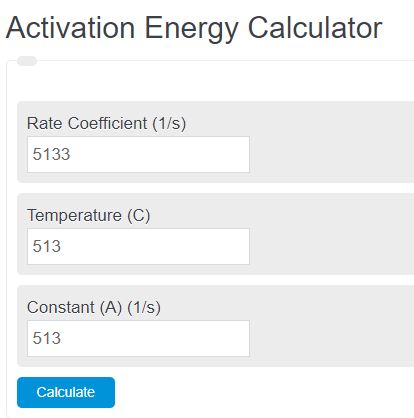Enter the temperature, rate coefficient, and constant. The activation energy calculator will evaluate and display the total activation energy.
- All Energy Calculators
- Thermal Conductivity Calculator (heat flux)
- Carnot Efficiency Calculator
- Enthalpy Calculator
- Energy Calculator
- Ionization Energy Calculator
- Reverse Activation Energy Calculator
- Ligand Efficiency Calculator
Activation Energy Formula
The following equation can be used to calculate the activation energy of a reaction.
E = -R * T * ln(k/A)
- Where E is the activation energy
- R is the gas constant
- T is the temperature
- k is the rate coefficient
- A is the constant
To calculate the activation energy, multiply the gas constant by the temperature, then multiply by the natural log of the ratio of the rate coefficient over the constant.
Activation Energy Definition
Activation Energy is the total energy needed for a chemical reaction to occur. It’s most often used in chemistry and thermodynamics. These reactions can include things like combustion.
Activation Energy Example
How to calculate an activation energy?
- First, determine the temperature.
Measure the temperature of the substance.
- Next, determine the rate coefficient.
Measure or calculate the rate coefficient.
- Next, determine the constant A.
Empirically determine the constant A.
- Finally, calculate the activation energy.
Using the formula above, calculate the activation energy.
FAQ
What factors influence the activation energy of a reaction?
Several factors can influence the activation energy of a chemical reaction, including the nature of the reactants, the presence of catalysts, the temperature at which the reaction occurs, and the solvent in which the reaction takes place. Catalysts, in particular, can significantly lower the activation energy required for a reaction.
How does temperature affect the activation energy and rate of a reaction?
Temperature plays a crucial role in chemical reactions. As temperature increases, the kinetic energy of the molecules involved in the reaction also increases. This leads to a higher probability of successful collisions between reactant molecules, effectively lowering the activation energy barrier and increasing the rate of the reaction.
Can the activation energy of a reaction be negative?
In theory, the activation energy of a reaction is always positive because it represents the energy barrier that must be overcome for the reaction to proceed. However, in the context of calculating activation energy using certain equations, a negative value might indicate an exothermic reaction where energy is released. It’s important to interpret such results within the context of the specific reaction and conditions.
